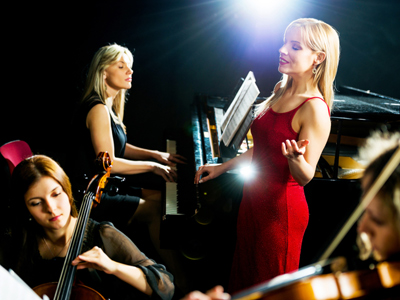
Ask the AI Tutor
Need help with Writing Playscripts? Ask our AI Tutor!
AI Tutor - Lucy
Connecting with Tutor...
Please wait while we establish connection

In what part of the theatre does an orchestra sit?
Writing Playscripts
Playscripts show stories through dialogue and stage directions. Learn how to format speech, add actions, and keep scenes moving.
1 .
What is the name given to the part of a stage that is in front of the curtain?
The pro-curtain
The curtain aisle
The fore-curtain
The proscenium
That will impress your teacher. The plural is 'proscenia'
2 .
What is the name given to the part of the stage that is behind the curtain and closest to the audience?
Front stage
Downstage
Forward stage
The theatre front
It's not called the 'front stage'!
3 .
What is the name given to the part of the stage that is behind the curtain and furthest from the audience?
Backstage
Upstage
Rear stage
The theatre rear
You could have guessed that it was the opposite of 'downstage'
4 .
What is the name given to the part of the stage that is behind the curtain and which occupies the middle of the stage?
Centre stage
Middle stage
Central stage
The mid-stage
Now you know the parts of a theatre stage. Your teacher and friends will be impressed. By the way, the floor area of a theatre stage is divided as follows (facing the audience and walking backwards from the proscenium): 1. down right - downstage - down left; 2. stage right - centre stage - stage left; 3. up right- upstage - up left. Note: The areas of the stage are named from the actor’s point of view
5 .
In the world of theatre, you often hear the expression "Break a leg!" What does it mean?
Good luck
I hope your play fails
If you are scared of going on stage at the last minute, pretend you have injured yourself
Try and get the audience's sympathy if the play is not going well
It's theatrical slang
6 .
What is the name given to the areas to the sides of the stage which cannot be seen by the audience?
Concealed aisles
Alleys
Wings
Curtain recesses
Have you ever heard the expression 'waiting in the wings'? It means that someone in the background and close at hand is ready to act on short notice
7 .
In some theatres there is a place for an orchestra. What is this place called?
The orchestra hole
The orchestra pit
The orchestra ditch
The orchestra trench
It's also called the 'pit'. It's usually situated immediately in front of the theatre stage or under the front part of it
8 .
What is the name given to the part of the theatre which is not situated on the stage and not visible to the audience?
The back of the theatre
Backstage
Behind the theatre
The rear of the theatre
'Backstage' is the term used to describe the areas of the theatre whose workings can't be seen by the audience, e.g. lighting effects, dressing rooms, make-up rooms and special effects
9 .
What is meant by the term 'stand-in'?
Be confident!
It's a cue (signal) for an actor to come on stage
Somebody who acts as a temporary replacement for another actor
Somebody who permanently replaces another actor
In the world of cinema, it means a film actor’s double. Stand-ins are often used for performing stunts that are considered too dangerous for the actor to perform: that's why stuntmen are used
10 .
What is meant by the expression 'curtain call'?
This is what the audience shouts when it is not happy with the play
This is what the play's director says when he wants the curtains drawn at the end of an act
This is the expression used by the management to inform the audience that the play has ended
This is the return to the stage by the actors at the end of a performance to receive the audience’s applause
Really good plays get many curtain calls
**Unlimited Quizzes Await You! 🚀**
Hey there, quiz champ! 🌟 You've already tackled today's free questions.
Ready for more?
Ready for more?
🔓 Unlock UNLIMITED Quizzes and challenge yourself every day. But that's
not all...
not all...
🔥 As a Subscriber you can join our thrilling "Daily Streak" against other
quizzers. Try to win a coveted spot on our Hall of Fame Page.
quizzers. Try to win a coveted spot on our Hall of Fame Page.
Don't miss out! Join us now and keep the fun rolling. 🎉
**Unlimited Quizzes Await You! 🚀**
Hey there, quiz champ! 🌟 You've already tackled today's free questions. Ready for more?
🔓 Unlock UNLIMITED Quizzes and challenge yourself every day. But that's not all...
🔥 As a Subscriber you can join our thrilling "Daily Streak" against other quizzers. Try to win a coveted spot on our Hall of Fame Page.
Don't miss out! Join us now and keep the fun rolling. 🎉






